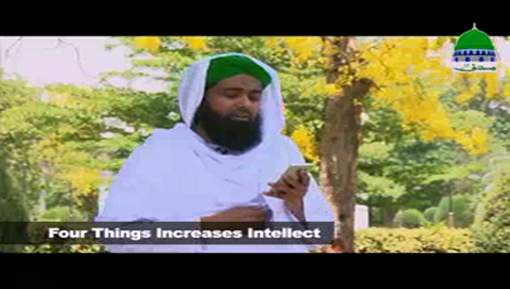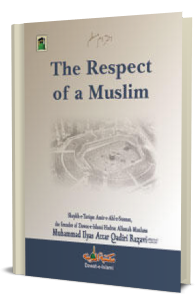
Explanation of Hadees
An increase in honour
Maulana Nasir Jamal Attari Madani
The Prophet صَلَّى الـلّٰـهُ عَلَيْهِ وَاٰلِهٖ وَسَلَّم stated: ‘مَا زَادَ اللهُ عَبْدًا بِعَفْوٍ اِلَّا عِزًّا’, Allah عَزَّوَجَلَّ increases the honour of the person who forgives.’ (Muslim, p. 1071, Hadees 6592)
This Hadees may relate to honour in this world, whereby the individual who forgives others is held in greater esteem by people, or it can relate to the honour that forgiving people will receive in the hereafter. (Daleel-ul-Faliheen, vol. 4, p. 538, summarised)
In either case, the Hadees makes an unequivocal distinction between actual honour in the sight of Allah عَزَّوَجَلَّ and the type of honour that society encourages. Honour, as per mistaken societal norms, is acquired by exacting revenge against others for the slightest misdemeanour or by bullying and berating those who are less privileged or weaker than us. These truly repugnant perceptions of honour and respect have led to nothing but a society imbued with disharmony, riddled with disputes, violence, and murder. A discerning look reveals that feigned apologies and pretentious acts of remorse are at the heart of the diseases that plague our communities. Unfortunately, most apologies have been reduced to empty words, where phrases like, ‘Forgive me,’ and ‘Sorry,’ are uttered by the tongue, but the scars of enmity remain deeply etched in the heart and the burning passion for revenge continues to roar within. Unless we transform the very spirit of our approach, neither can we genuinely respect others nor can we be truly respected.
With this heart-wrenching reality before us, we can feel the dire need for solution. So, let us reflect on an incident from the life of our Prophet صَلَّى الـلّٰـهُ عَلَيْهِ وَاٰلِهٖ وَسَلَّم, the mercy for mankind:
When Sayyidatuna Umm-e-Hakeem Bint-e-Haaris Makhzumiyyah رَضِیَ الـلّٰـهُ عَنْهَا visited the Prophet صَلَّى الـلّٰـهُ عَلَيْهِ وَاٰلِهٖ وَسَلَّم to accept Islam, she رَضِیَ الـلّٰـهُ عَنْهَا remarked: ‘Messenger of Allah! ‘Ikrimah is fleeing to Yemen; he fears that you may execute him. Kindly, grant him refuge.’ Upon hearing this, the Prophet صَلَّى الـلّٰـهُ عَلَيْهِ وَاٰلِهٖ وَسَلَّم granted him refuge. Umm-e-Hakeem رَضِیَ الـلّٰـهُ عَنْهَا then began to search for her husband. She رَضِیَ الـلّٰـهُ عَنْهَا found him in the coastal area of Tihamah and cried out: ‘I have come to you on behalf of the most virtuous and pious person, the Prophet صَلَّى الـلّٰـهُ عَلَيْهِ وَاٰلِهٖ وَسَلَّم; so do not ruin yourself.’ After she رَضِیَ الـلّٰـهُ عَنْهَا informed him about the refuge granted to him, ‘Ikrimah asked: ‘Did you actually do this?’ She رَضِیَ الـلّٰـهُ عَنْهَا responded: ‘Yes, I implored him and he agreed to give you refuge.’ Having heard this, he returned with Umm-e-Hakeem رَضِیَ الـلّٰـهُ عَنْهَا to the Prophet صَلَّى الـلّٰـهُ عَلَيْهِ وَاٰلِهٖ وَسَلَّم, embraced Islam, and made everyone there a witness to this. He then sought pardon from the Prophet صَلَّى الـلّٰـهُ عَلَيْهِ وَاٰلِهٖ وَسَلَّم for his past errors, (Kitab-ul-Tawabeen, p. 123, summarised). The Beloved Prophet’s altruistic act of forgiveness was so impactful that it drove ‘Ikrimah to Islam; a person who had previously fought wars against the Muslims and whose father was none other than Islam’s worst enemy, Abu Jahl. Not only did he become a Muslim, but a heroic companion who would eventually give his life for the cause of Islam and join the ranks of the martyrs.
This radiant, prophetic model continues to shine today, through pious Muslims who readily forgive and pardon others. Allah Almighty rewards them with honour and respect among His creation in this World. In a famous incident, a righteous man, who was collecting donations for his religious seminary, visited a large store for this noble purpose. After greeting the owner, he explained the reason for his visit but he was met with hostility and the store owner spat on his face. The righteous man cleaned his face and with a smile remarked: ‘Sir, this was for me. Now tell me, what will you donate to my seminary?’ These unexpected words and forbearing approach surprised the store owner. Overcome with sheer embarrassment and tears, he pleaded to the visitor: ‘Your eminence, I committed a gross mistake; please forgive me. I will donate any amount you want.’
Incidents like this offer us many pearls of wisdom to garner, only if we reflect. If we, as a society, hasten to sincerely forgive others instead of rushing to react inappropriately, only then will we have a chance of living with mutual respect and harmony. To clarify this further, we need to take a closer look at how forgiveness begets respect:
1. For someone to forgive others, despite having the ability to take revenge, causes acceptance and love in the heart of the wrongdoer. Conversely, taking revenge incites a negative response. This is an inseparable aspect of the human psyche which we can see throughout history. It was this very relationship between forgiveness and acceptance that drove the disbelievers of Mecca to embrace Islam en masse and become loyal adherents when the Prophet صَلَّى الـلّٰـهُ عَلَيْهِ وَاٰلِهٖ وَسَلَّم pardoned them during the conquest of Mecca.
2. There is a famous saying, ‘Do good, feel good.’ This is a reality, as one feels content after performing a good deed. Also, by forgiving, we feel motivated to perform further good acts. Moreover, the person who wronged you will acknowledge their mistake if your response is positive, gracious, and forgiving.
3. Forgiving others severs the roots of enmity and hatred, creates a conducive environment for resolving conflicts, and promotes mutual respect. In this way, all factors that diminish one’s respect are mitigated through the act of forgiveness.


















Comments